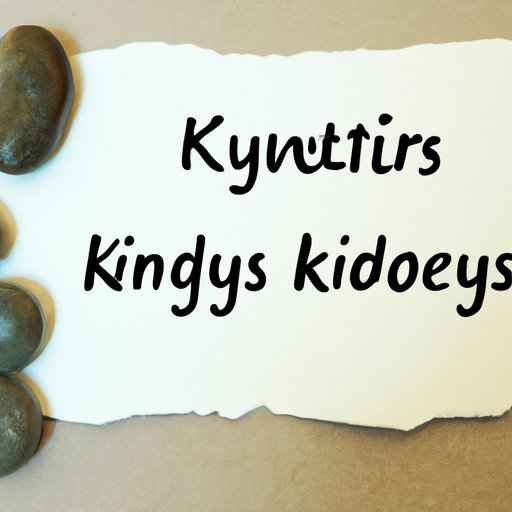
Introduction
Kidney stones are solid mineral deposits that form inside the kidneys or urinary tract. They can cause sharp pain, vomiting, and difficulty urinating. Kidney stones can form due to various factors such as dehydration, a diet that’s high in salt and protein, obesity, and certain medical conditions. If left untreated, kidney stones can lead to serious complications, including kidney damage and infections. Luckily, there are multiple ways to help pass kidney stones or prevent them from forming in the first place. In this article, we’ll explore natural remedies, diet and lifestyle changes, and surgical options that can help you get rid of kidney stones and prevent their formation.

7 Natural Remedies to Help Pass Kidney Stones Faster
Natural remedies have been shown to help break down kidney stones and make them easier to pass. Here are seven natural remedies that you can try:
- Apple cider vinegar: Mix two tablespoons of apple cider vinegar with six to eight ounces of water and drink it throughout the day. Apple cider vinegar can help break down the kidney stones, making them easier to pass. However, it should be noted that apple cider vinegar is acidic and can cause irritation if taken in excess.
- Lemon juice: Add freshly squeezed lemon juice to water and drink it throughout the day. Lemons contain citric acid, which can help break down calcium-based kidney stones. Drinking lemon juice can also increase urine volume, which helps flush out the stones. However, the acid in lemons can erode tooth enamel if consumed excessively.
- Olive oil: Mix two ounces of olive oil with two ounces of freshly squeezed lemon juice and drink it. The combination of olive oil and lemon juice can help lubricate the urinary tract, making it easier to pass the stones.
- Magnesium supplements: Magnesium can prevent the formation of certain types of kidney stones by inhibiting the binding of calcium and oxalate in the urine. Taking magnesium supplements can also help break down existing stones.
- Dandelion root: Dandelion root tea can help increase urine production, which helps flush out kidney stones. It can also help reduce inflammation and pain associated with kidney stones.
- Pomegranate juice: Pomegranate juice has antiviral and antibacterial properties that can help prevent infections that can occur when the stones are passed. Pomegranate juice can also inhibit the formation of certain types of kidney stones.
- Basil tea: Basil is a natural diuretic that can help increase urine production and flush out kidney stones. Brew a cup of basil tea by steeping basil leaves in hot water for ten minutes.
While these natural remedies are generally safe, they may not be suitable for everyone. Always consult with your healthcare provider before trying any new remedies, and stop using them if you experience any adverse reactions.
The Best Foods to Eat When Trying to Pass a Kidney Stone
Diet plays a crucial role in preventing and treating kidney stones. Here are some of the best foods to eat when trying to pass a kidney stone:
- Watermelon: Watermelon is a natural diuretic that can help flush out kidney stones. It also contains potassium, which can help regulate blood pressure.
- Green leafy vegetables: Vegetables such as spinach, kale, and Swiss chard are high in magnesium, which can help prevent the formation of certain types of kidney stones.
- Whole grains: Whole grains such as brown rice, oats, and whole-wheat bread are high in fiber, which can help reduce the risk of kidney stones.
- Low-fat dairy: Dairy products such as milk, yogurt, and cheese are high in calcium, which can help prevent the formation of certain types of kidney stones.
- Citrus fruits: Fruits such as oranges, grapefruits, and tangerines are high in citric acid, which can help prevent the formation of calcium-based kidney stones.
Incorporating these foods into your regular diet can help prevent kidney stones from forming and make it easier to pass them if they do occur. Here are some recipe ideas for incorporating these kidney-friendly foods into your meals:
- Make a watermelon and feta salad with fresh mint and lime juice
- Toss greens such as spinach or kale with whole-grain pasta, roasted veggies, and low-fat cheese
- Prepare a breakfast bowl with steel-cut oats, low-fat milk, and fresh berries
- Snack on a piece of whole-grain toast with low-fat cream cheese and sliced citrus fruit
Lifestyle Changes to Prevent Kidney Stones from Forming
One of the most effective ways to prevent kidney stones from forming is by making certain lifestyle changes. Here are some lifestyle changes that you can adopt:
- Drink more water: Staying hydrated is key to preventing kidney stones from forming. Aim to drink at least eight glasses of water per day, and more if you’re physically active or live in a hot climate.
- Reduce sodium intake: Consuming too much sodium can increase the amount of calcium in your urine, which can contribute to the formation of kidney stones. Avoid processed foods and limit your intake of salt.
- Get regular exercise: Exercise can help prevent the formation of kidney stones by improving urine flow and reducing the amount of calcium in the urine.
- Avoid high-protein diets: Consuming too much protein can increase the amount of uric acid in your urine, which can contribute to the formation of certain types of kidney stones.
Making these lifestyle changes part of your daily routine can help prevent kidney stones from forming and reduce your risk of complications.
Breaking Down the Myths of Kidney Stone Treatment Options
There are many myths surrounding the treatment of kidney stones. Here are some common misconceptions and the truth behind them:
- Myth: Surgery is always necessary to remove kidney stones. Fact: Surgery is only necessary in severe cases when the stones are too large to pass on their own or are causing significant pain or infection.
- Myth: Cutting out certain foods from your diet can guarantee that you won’t get kidney stones. Fact: While diet plays a role in kidney stone formation, other factors such as genetics and medical conditions can also contribute to their development.
- Myth: Drinking hard water can cause kidney stones. Fact: Drinking hard water doesn’t necessarily increase your risk of kidney stones. In some cases, it may even have beneficial effects on the body.
- Myth: Over-the-counter pain relievers are always safe to take for kidney stone pain. Fact: Overuse of pain relievers such as ibuprofen can cause kidney damage. Always follow the recommended dosage and talk to your healthcare provider before taking any medication.
It’s essential to consult with your healthcare provider to determine the best treatment plan for your kidney stones. They can help you make informed decisions and ensure that you’re receiving safe and effective treatment.
How Exercise Can Help You Get Rid of Kidney Stones
Exercise can help prevent and treat kidney stones. Here’s how:
- High-intensity interval training (HIIT): HIIT can help improve blood flow and reduce the amount of calcium in the urine, which can prevent the formation of kidney stones. It can also help reduce inflammation and pain associated with kidney stones.
- Yoga: Certain yoga poses such as twists and forward bends can help stimulate digestion and improve urine flow, which can help flush out kidney stones.
- Cardiovascular exercise: Regular cardio exercise such as jogging or swimming can help improve overall kidney function and reduce the risk of kidney stones.
It’s essential to listen to your body when exercising and avoid any activities that cause pain or discomfort. Always consult with your healthcare provider before starting a new exercise routine, especially if you have kidney stones or other underlying medical conditions.
Drink More Water: The Key to Preventing and Treating Kidney Stones
Staying hydrated is the most crucial step in preventing and treating kidney stones. Here are some tips for increasing your water intake:
- Carry a refillable water bottle with you wherever you go
- Infuse water with fruit or herbs for added flavor
- Drink a glass of water before every meal
- Eat more foods with high water content, such as watermelon and cucumbers
The amount of water you should be drinking each day depends on various factors such as your age, sex, and activity level. A general rule of thumb is to aim for at least eight glasses of water per day, but you should talk to your healthcare provider to determine the appropriate amount for you.
Surgical Options for Removing Kidney Stones: Things to Consider
Surgery is typically only necessary in severe cases when the stones are too large to pass on their own. Here are some surgical options that you may be offered:
- Shock wave lithotripsy (SWL): SWL uses sound waves to break up the kidney stones into smaller pieces, which can then be passed through the urine. This procedure is non-invasive and usually doesn’t require a hospital stay.
- Ureteroscopy: Ureteroscopy involves inserting a small telescope into the urethra and bladder to locate the stones. The stones are then broken up with a laser or removed with a small basket. This procedure typically requires general anesthesia.
- Percutaneous nephrolithotomy (PNL): PNL involves making a small incision in the back to access the kidney. The stones are then broken up with a laser and removed with a small instrument.




